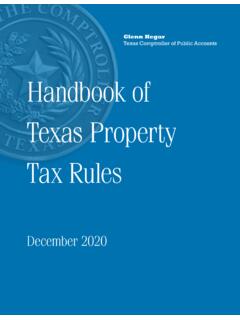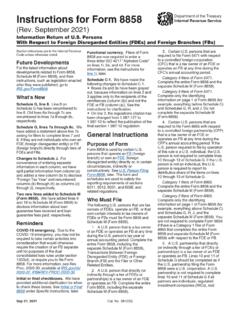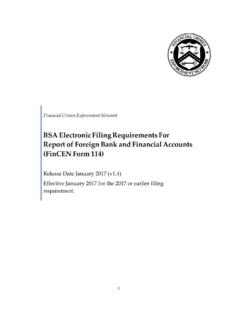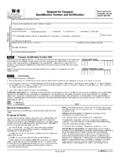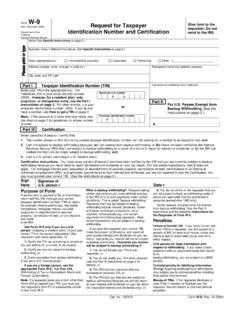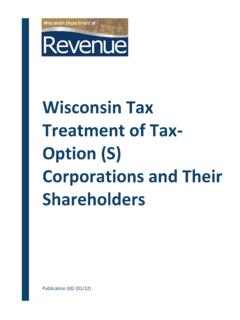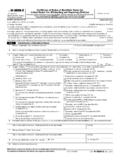Transcription of 05-908 2020 Texas Franchise Tax Report Information and ...
1 2020 Texas Franchise Tax Report Information and InstructionsForm 05-908 (9-19)Topics covered in this booklet:Amended 10 Annual Reports .. 4 Annualized Total Revenue .. 4 Change in Accounting Period .. 5 Combined 7 Credits .. 9 disregarded entities .. 3 Due 4 Electronic Funds Transfer (EFT) .. 6 entities Subject to Tax .. 2 entities Not Subject to Tax .. 2 Estimated Tax .. 4 Exempt 2 Extension of Time to File .. 6EZ 4 File and Pay Franchise Tax Electronically .. 1 Final Reports .. 5 Forfeiture .. 7 General Information .. 3 Minimum Franchise Tax .. 4 New Veteran-Owned Businesses .. 3 Passive entities .. 2 Penalties and Interest .. 6 Tax 3 Tiered Partnership Election .. 9 Where to File .. 10 Index of forms:Form # Title05-102 Public Information Report .. 1205-158-A Franchise Tax Report , page 1 .. 1205-158-B Franchise Tax Report , page 2 .. 1905-160 Credits Summary Schedule .. 2105-163 No Tax Due Report .
2 2205-164 Extension Request .. 2305-165 Extension Affiliate List .. 2405-166 Affiliate Schedule .. 2505-167 Ownership Information Report .. 2605-169 EZ Computation .. 2605-170 Franchise Tax Payment Form .. 2705-175 Tiered Partnership Report .. 2705-177 Common Owner Information Report .. 2805-178 Research and Development Activities Credit Schedule .. 2805-180 Historic Structure Credit Supplement for Credit Claimed on Report .. 30 General Information This booklet summarizes the Texas Franchise tax law and rules and includes Information that is most useful to the greatest number of taxpayers preparing Texas Franchise tax reports. It is not possible to include all requirements of the Texas Tax Code Chapter 171. Taxpayers should not consider this tax booklet as authoritative law. Additional Information about Texas Franchise tax can be found online at s New for 2020?NexusThe Comptroller is currently updating Franchise tax Rule (Margin: Nexus) to incorporate the decision in Wayfair.
3 Franchise tax responsibilities for taxpayers impacted by Wayfair will apply for reports due on or after Jan. 1, Deduction Limit AdjustmentThe limit on the compensation deduction has been adjusted, as required by Texas Tax Code Section (b), and is now $390,000 per person for reports due on or after Jan. 1, 2020 and before Jan. 1, Tax Due ThresholdThe no tax due threshold has been adjusted, as required by Texas Tax Code Section (b), and is now $1,180,000 for reports due on or after Jan. 1, 2020 and before Jan. 1, Rights Society Exclusion from Total RevenueA Performing Rights Society may exclude from total revenue, to the extent included, payments made to the public performance rights holder and copyright owner for whom the taxable entity licenses the public performance. See Texas Tax Code Section (g-12).Aerospace Industry Deduction in Determining MarginCertain taxable entities in the aerospace industry may take an additional deduction in determining margin.
4 A qualified entity may subtract 20 percent of costs properly allocated and incurred under the Federal Acquisition Regulation for the sale of goods or services to the federal government that the taxable entity has not already subtracted under the cost of goods sold or compensation allowed deduction increases by 20 percent each year until 100 percent of aerospace costs are allowed for reports due on or after Jan. 1, 2024. See Texas Tax Code Section (e) and (f).File and Pay Franchise Tax ElectronicallyElectronically file and pay your Franchise tax Report using Webfile. It helps with mathematical computations and has built-in edits to help you avoid mistakes that could lead to unnecessary billings and the forfeiture of an entity s right to 1transact business in Texas . Electronic filing and paying is available 24 hours a you owe tax, electronic payment options include credit card, electronic check (Web EFT) or TEXNET (enrollment required).
5 To get started with Webfile for Franchise tax, you will need your 11-digit Texas taxpayer number and your 6-digit XT Webfile number listed on your Franchise Tax notice. Webfile is available online at is not recommended for combined groups with more than 10 reports can also be filed using approved tax preparation software. A list of approved providers is available at Filing of No Tax Due Reports RequiredAs of January 1, 2016, No Tax Due Reports must be filed a Webfile number?Call 800-442-3453, enter the taxpayer number when prompted and choose option number 1. Our automated system will require identifying Information , such as total revenue from a prior Report or last payment amount (if greater than zero), before releasing the Webfile Subject to TaxThe Franchise tax is imposed on the following entities that are either organized in Texas or doing business in Texas : corporations; limited liability companies (LLCs), including single member and series LLCs; banks; state limited banking associations; savings and loan associations; S corporations; professional corporations; partnerships (general, limited and limited liability); trusts; professional associations; business associations; joint ventures; and other legal Not Subject to TaxThe tax is not imposed on: sole proprietorships (except for single member LLCs); general partnerships where direct ownership is composed entirely of natural persons (except for limited liability partnerships).
6 entities exempt under Subchapter B of Chapter 171, Tax Code; certain unincorporated passive entities ; certain grantor trusts, estates of natural persons and escrows; real estate mortgage investment conduits and certain qualified real estate investment trusts; a nonprofit self-insurance trust created under Chapter 2212, Insurance Code; a trust qualified under Section 401(a), Internal Revenue Code; a trust exempt under Section 501(c)(9), Internal Revenue Code; or unincorporated political Rule for Information on nontaxable EntitiesSome entities may be exempt from the Franchise tax. The exemptions vary depending upon the type of organization. Exemptions are not automatically granted to an entity. For more Information on Franchise tax exemptions, go to : New veteran-owned businesses and entities that qualify as passive are not considered exempt EntitiesPartnerships (general, limited and limited liability) and trusts (other than business trusts) may qualify as a passive entity and not owe any Franchise tax for a reporting period if at least 90% of the entity s federal gross income (as reported on the entity s federal income tax return), for the period upon which the tax is based, is from the following sources: dividends, interest, foreign currency exchange gain, periodic and non periodic payments with respect to notional principal contracts, option premiums, cash settlements or termination payments with respect to a financial instrument, and income from a limited liability company; distributive shares of partnership income to the extent that those distributive shares of income are greater than zero.
7 Net capital gains from the sale of real property, net gains from the sale of commodities traded on a commodities exchange and net gains from the sale of securities; and royalties from mineral properties, bonuses from mineral properties, delay rental income from mineral properties and income from other non-operating mineral interests including non-operating working income does not include rent or income received by a non-operator from mineral properties under a joint operating agreement if the non-operator is a member of an affiliated group and another member of that group is the operator under the same joint operating passive entity that is registered, or is required to be registered with the Secretary of State (SOS) or the Comptroller s office must electronically file a No Tax Due Report (Form 05-163) annually to affirm that the entity qualifies as a passive entity. A passive entity is not required to file a Public Information Report (Form 05-102) or Ownership Information Report (Form 05-167).
8 A passive entity cannot be included as an affiliate of a combined group. LLCs cannot qualify as passive, even if filing as a partnership for federal income tax partnership or trust that qualifies as a passive entity for the period upon which the Franchise tax Report is based, and is not registered and is not required to be registered with the SOS or Comptroller s office, will not be required to register or file a Franchise tax Report with the Comptroller s passive entity not registered with the Comptroller s office that no longer qualifies as a passive entity must file a Nexus Questionnaire (Form AP-114), a Business Questionnaire (Form AP-224) or a Trust Questionnaire (Form AP-231) to register with the Comptroller s office and begin filing Franchise tax Veteran-Owned BusinessesENTITIES MUST BE PRE-QUALIFIEDNew veteran-owned businesses are not subject to Franchise tax for an initial five-year period. To be considered a new veteran-owned business, an entity must meet the following qualifications as verified by the Comptroller s office: be an entity formed or organized in Texas on or after Jan.
9 1, 2016, and before Jan. 1, 2020; be 100% owned by a natural person (or persons), each of whom was honorably discharged from a branch of the United States armed services; and provide a letter from the Texas Veterans Commission (TVC) verifying the honorable discharge of each taxable entity that is verified as a new veteran-owned business must file a No Tax Due Report (Form 05-163) for each reporting period the Franchise tax is not imposed on the taxable entity. However, the new veteran-owned business is not required to file a Public or Ownership Information Report . A new veteran-owned business cannot file as a member of a combined group or as part of a tiered Comptroller s office must be notified if the ownership of the new veteran-owned business changes at any point during the initial five-year period. If during the initial five-year period a new veteran-owned business no longer meets the above criteria, it will become subject to the Franchise the verification process and additional Information please visit the Comptroller s website at you are a veteran and your entity was formed prior to January 1, 2016, please contact the Texas Veterans Commission for other resources that may be available to you at 800-252-8387 or EntitiesAn entity s treatment for federal income tax purposes does not determine its responsibility for Texas Franchise tax.
10 Therefore, partnerships, LLCs and other entities that are disregarded for federal income tax purposes are considered separate legal entities for Franchise tax reporting purposes. The separate entity is responsible for filing its own Franchise tax Report unless it is a member of a combined group. If the entity is a member of a combined group, the reporting entity for the group may elect to treat the entity as disregarded and will not unwind its operations from its parent entity. In this instance, it will be presumed that both the parent entity and the disregarded entity have nexus in Texas for apportionment purposes only. Whether or not the entity is disregarded for Franchise tax, it must be listed separately on the affiliate schedule. Additionally, if the disregarded entity is organized in Texas or has nexus in Texas , it will be required to file the appropriate Information Report (Form 05-102 or 05-167).MarginUnless a taxable entity qualifies and chooses to file using the EZ computation or No Tax Due Report , the tax base is the taxable entity s margin and is computed in one of the following ways: Total Revenue times 70% Total Revenue minus Cost of Goods Sold (COGS) Total Revenue minus Compensation Total Revenue minus $1 : Not all entities will qualify to use COGS to compute margin.



